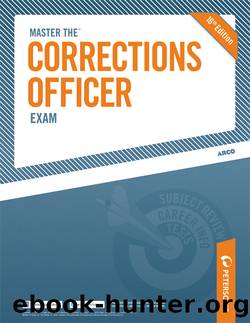Master the Corrections Officer Exam by Peterson's

Author:Peterson's
Language: eng
Format: epub
Tags: STU029000
ISBN: 9780768930306
Publisher: Peterson's
Published: 2010-09-01T00:00:00+00:00
Practice Test 4
100 QUESTIONS ⢠3 HOURS 30 MINUTES
Directions: Each question has four suggested answers. Decide which one is the best answer.
1. âCertain inmate types are generally found in prisons. These types are called gorillas, toughs, hipsters, and merchants. Gorillas deliberately use violence to intimidate fearful inmates into providing favors. Toughs are swift to explode into violence against prisoners because of real or imagined insult. Exploitation of others is not their major goal. Hipsters are bullies who choose victims with caution in order to win acceptance among inmates by demonstrating physical bravery. Their bravery, however, is false. Merchants exploit other inmates through manipulation in sharp trading of goods stolen from prison supplies or in trickery in gambling.â
Based on the above information, the inmate who beats other inmates so that they provide him with extra cigarettes and coffee is, most likely, a
(A) tough.
(B) gorilla.
(C) merchant.
(D) hipster.
2. A Corrections Officer may not smoke while on duty or in any nonsmoking areas of the correctional facility at any time. The Receiving Room is a non-smoking area.
Officer Jomes arrives at the facility 15 minutes before his shift begins. He visits the officer on duty in the Receiving Room and, while there, smokes two cigarettes. Officer Jomesâs conduct is
(A) proper, because no one in the Receiving Room objects to the cigarette smoke.
(B) improper, because there is no smoking allowed in the Receiving Room at any time.
(C) proper, because Officer Jomes is not yet on duty.
(D) improper, because Officer Jomes should be more concerned about his health.
3. A Corrections Officerâs badge is a proud possession. It identifies him or her as a trained professional on the prison staff. The badge is issued to the Corrections Officer but remains the property of the Corrections Department. The department requires that the Corrections Officer wear the badge over the left pocket whenever in uniform and that the Corrections Officer keep it within his or her possession at all times.
Corrections Officer Berkey is at home on his day off and is trying to get some well-deserved rest. His four-year-old son, Billy, is whining and begging his daddy to take him to the zoo. Finally, Corrections Officer Berkey hands his badge to Billy saying, âGo out and play Corrections Officer with your friends and leave me alone.â Corrections Officer Berkeyâs action is
(A) proper; he needs his rest.
(B) improper; Billy is not wearing a uniform.
(C) proper; Billy is his own child and is under his control.
(D) improper; regulations require a Corrections Officer to physically possess the badge even when not wearing it.
4. The constitutionally guaranteed attorneyâclient privilege provides that the information a client gives to an attorney be kept in confidence. The attorney may advise the client and may prepare a defense based on this private information but must not disclose any of it to the court or to the public.
Attorney Kleiner has come to see Inmate Greene, who is awaiting trial in a matter alleging racial bias. Kleiner has a reputation of being a fiery defense attorney; some would even suggest that he engages in unethical tactics.
Download
This site does not store any files on its server. We only index and link to content provided by other sites. Please contact the content providers to delete copyright contents if any and email us, we'll remove relevant links or contents immediately.
1,001 ASVAB Practice Questions For Dummies by Powers Rod(4328)
ASVAB For Dummies by Powers Rod(2695)
Police Exams Prep 2018-2019 by Kaplan Test Prep(2335)
Churchill by Paul Johnson(2331)
Wonder by R J Palacio(1964)
Wiley CPA Examination Review Focus Notes by Kevin Stevens(1808)
1936941139 (N) by Bob Rosenthal(1734)
First Aid Handbook--Crucial Survival Skills, Emergency Procedures & Lifesaving Medical Information by Department of the Army(1706)
A Very Stable Genius by Philip Rucker & Carol Leonnig(1548)
ASVAB AFQT For Dummies by Rod Powers(1541)
1,001 ASVAB AFQT Practice Questions For Dummies by Angie Papple Johnston(1376)
U.S. Army Combat Pistol Training Handbook by Army(1369)
CISSP For Dummies by Miller Gregory Peter(1360)
Future Design by Unknown(1355)
The GED Crash Course by Alpha(1326)
McGraw-Hill Education 2,000 Review Questions for the CPA Exam by Denise M. Stefano(1272)
Master the Civil Service Exams by Peterson's(1266)
Court Officer Exam by Learning Express LLC(1257)
Master the ASVAB by Scott Ostrow(1245)
